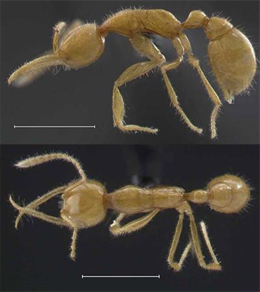Scientists discover 120 million year-old ant in the Amazon rainforest
Scientists discover 120 million year-old ant in the Amazon rainforest
mongabay.com
September 17, 2008
Scientists have discovered a previously unknown species of ant in the Amazon that may shed light on the evolution of ants. The species is believed to be the oldest-known ant at around 120 million years old. The discovery is presented this week in the journal Proceedings of the National Academy of Sciences.
The species — named Martialis heureka or the “ant from Mars” due to its unusual characteristics — is blind, subterranean, and predatory, according to Christian Rabeling, the University of Texas at Austin biologist, who discovered the insect. The ant is so unique that it has been placed in its own new subfamily, the first such treatment of a living species of ant since 1923.
 Microscopic photo of Martialis heureka by C. Rabeling and M. Verhaagh / National Academy of Sciences Microscopic photo of Martialis heureka by C. Rabeling and M. Verhaagh / National Academy of Sciences
|
“This discovery hints at a wealth of species, possibly of great evolutionary importance, still hidden in the soils of the remaining rainforests,” write the authors.
Rabeling says the discovery will provide clues on the evolution of ants.
“This discovery lends support to the idea that blind subterranean predator ants arose at the dawn of ant evolution,” he said. “Based on our data and the fossil record, we assume that the ancestor of this ant was somewhat wasp-like, perhaps similar to the Cretaceous amber fossil Sphecomyrma, which is widely known as the evolutionary missing link between wasps and ants.”
Christian Rabeling, Jeremy M. Brown, and Manfred Verhaagh (2008). Newly discovered sister lineage sheds light on early ant evolution. PNAS Online Early Edition for the week of September 15-19, 2008.







